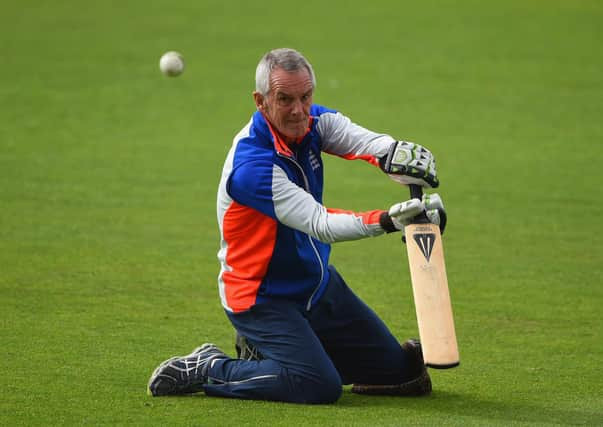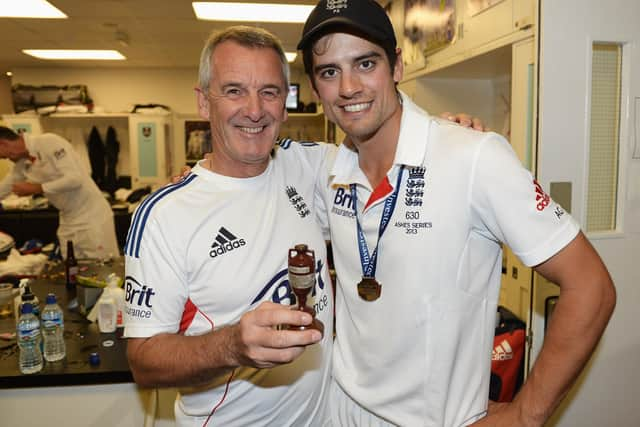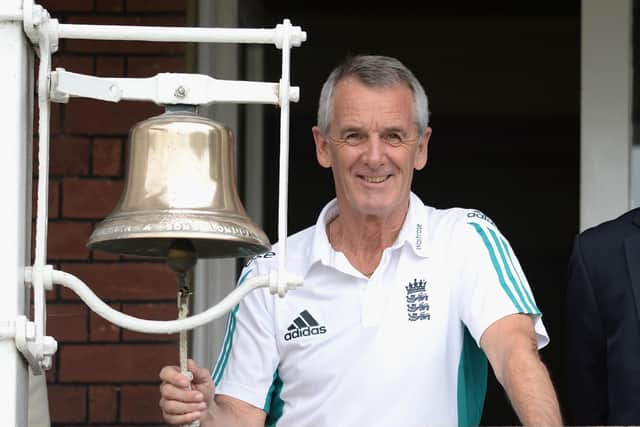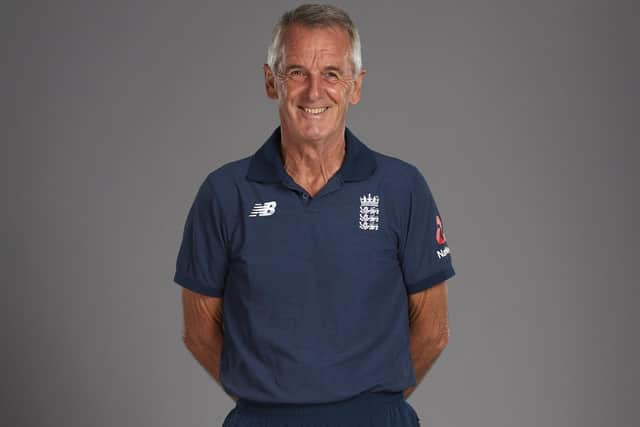Phil Neale, the Lincoln City hero who helped England win the Ashes


Phil Neale was one of my first sporting heroes.
He played in the first football match I ever watched – Lincoln City 8 Northampton Town 0 – at Sincil Bank in 1980.
It was a result that left this wide-eyed schoolboy forever addicted to his hometown club.


Advertisement
Hide AdAdvertisement
Hide Ad“I remember that game specifically,” he says. “We were about 7-0 up at the time and in their half, and their right-winger nutmegged me. He went round me and said, ‘Nutmegged!’, making a big fuss about the fact that he’d poked the ball through my legs. I said, ‘Mate, have you looked at the score!’”
Neale chuckles and sighs: “The little victories…”
Two years later, Neale played in a 9-0 win against Harry Redknapp’s Bournemouth in Redknapp’s first match as a manager.
It was one of the few home games I missed as a child as my dad had decided that we should instead use the last Saturday before Christmas to put up our tree and decorations – particularly in view of the icy weather that had been expected to force a postponement (whoops).


Mobile and moustachioed, inventive and intelligent, Neale played left-back in a Lincoln team that came within a whisker of reaching the old Second Division under Colin Murphy, having been brought to the club in the mid-1970s by Graham Taylor, who you may recall went on to bigger and better things.
Advertisement
Hide AdAdvertisement
Hide AdAs did Neale in the context of a sporting career that would have been impressive enough had it been confined to 369 matches and two promotions with Lincoln.
But he was richly gifted at cricket too, playing 692 first-class and one-day games combined for Worcestershire as a right-hand batsman and captaining them to a clutch of trophies including two County Championships.
Neale, 66, was the last man to regularly play professional football and cricket and he went on to coach Northamptonshire, Warwickshire and England A.


He led England U19s to glory at the 1998 World Cup, and he was a key member of the England men’s team as its operations manager from 1999 until his retirement at the end of last month, the announcement of which prompted well-wishes from such as Jonny Bairstow – “the first person on the phone” – and Ben Stokes, who wrote on Twitter: “Thanks for all the hard work over the years Phil.”
Advertisement
Hide AdAdvertisement
Hide AdResponsible for supporting the England squad at home and abroad, involving all manner of planning, preparation and organisational tasks, Neale served six head coaches, 11 Test captains and worked on 257 Test matches, 422 one-day internationals and 110 T20 internationals, experiencing at close hand five Ashes series wins, the 2010 T20 World Cup triumph and, of course, last year’s 50-over World Cup success.
Not bad for a proud son of Scunthorpe who can boast a 45-year involvement in professional sport, and who was effectively assistant coach to Duncan Fletcher when he first joined the England set-up, a time which Neale enjoyed enormously as he had more hands-on responsibility with the players in the era before specialist coaches.
Neale had something else in addition to his sporting gifts – brains. He gained an honours degree in Russian at Leeds University, where he studied from 1972-1975. At first, Neale’s academic abilities made him a target for dressing room banter.
“Be clever enough to act the peasant at times,” Taylor told him in his early days at Sincil Bank, adding that Neale “soon became a popular, respected player who never talked down to anyone… as much a sign of intelligence as passing university exams”.
Advertisement
Hide AdAdvertisement
Hide AdNeale was still at university when he made his Lincoln debut and recalls one related incident from that time.
“I remember travelling down on the team bus to play in a match, trying to read War and Peace, ready for my finals at Leeds University,” he says.
“Of course, I didn’t get much understanding from the rest of the players. (Lincoln striker) Percy Freeman actually picked up one of my books and threw it out the window!”
It was, suffice to say, all part of the induction.
While at Leeds, Neale played cricket for Pudsey St Lawrence in the Bradford League, a move facilitated by Phil Carrick, the former Yorkshire cricketer, before being offered a trial at Worcestershire.
Advertisement
Hide AdAdvertisement
Hide AdHe made his first-class debut for Worcestershire in the summer of 1975 – five months after his first appearance for Lincoln, having been recommended to Graham Taylor by Taylor’s own father, who was a sports reporter for the Scunthorpe Evening Telegraph.
At first, cricket and football dovetailed well.
There was a verbal understanding that Neale would go wherever the need was greatest; if Lincoln were challenging for honours, then football would take precedence, and vice-versa.
“There was a lot of understanding,” he says. “Graham Taylor was very tolerant, although around the time that he left (for Watford in 1977), it became difficult under manager Willie Bell, who didn’t see eye-to-eye with me on cricket at all.
“I actually read in the paper that I’d been suspended when I was still finishing off the season with Worcester, instead of reporting back for pre-season training, and it just went from bad to worse.
Advertisement
Hide AdAdvertisement
Hide Ad“I was very close to walking away from football at that stage, but then he got the sack and Colin Murphy came in and was very understanding with my cricket. Like Graham, he liked the game himself and didn’t see any reason why I should be penalised, and we worked through it as best we could.”
Even so, there was one occasion when Neale was put in an invidious position. In May 1982, with Lincoln knocking on the door of Division Two, they faced a crunch game at Chester on the very day that Neale should have been captaining Worcestershire for the first time in a Benson and Hedges Cup match against Yorkshire at Headingley.
Two days earlier, Murphy sent him a telegram saying that the Lincoln directors expected him to report to Chester on the Saturday and that his hands were tied.
Neale started that Saturday at Headingley, even walking out to look at the pitch before leaving himself out of the team and driving to the north-west, only to get stuck in motorway traffic.
Advertisement
Hide AdAdvertisement
Hide Ad“There were no mobile phones in those days, and you had to name your side at two o’clock and I hadn’t told Lincoln I was definitely coming; I’d left them hanging a bit,” he says.
“I came off the motorway, pulled up and managed to find a phone box – only the phone had been vandalised and came away in my hand.
“I got back in my car and saw someone in their garden, ran up the drive and said, ‘Can I use your phone?’ I rang the Lincoln secretary and said I’d be there in time for the three o’clock start, and to put me in the team. I got there just in time; we won 2-1.”
Neale drove back to Headingley, arriving just as the crowd was filing away.
Advertisement
Hide AdAdvertisement
Hide AdWorcestershire had secured a dramatic two-wicket win – a feat they repeated the following day in a John Player League fixture at Huddersfield, where Neale hit a match-winning 45 not out.
Nine days later, Lincoln travelled to Fulham for the final game of the Division Three campaign. “We had to win to go up, and they had to draw to go up,” he says. “The score was 1-1, and we had about 20 minutes to get a goal for promotion, having been reduced to ten men.
“We had balls kicked off the line, their goalie making brilliant saves, everything except a goal, and it ended in a draw. We should have gone up, but we didn’t have the money to spend to help a small squad, and that squad then began to break up.”
Neale knew that his chance of higher level football had gone in the process.
Advertisement
Hide AdAdvertisement
Hide Ad“I’d like to think I could have played at a higher level, although to do so I’d have had to give up cricket. At that stage, a higher division club would have made you make the choice. There were rumours, at one stage, just after Graham Taylor left, that Derby County were interested, but I got injured playing cricket and that was that.”
Neale left Lincoln after the 1984-85 season that ended with the tragedy of the Bradford fire.
He had returned to Worcestershire just beforehand and actually scored a century against the touring Australians at New Road on the fateful day.
Afterwards, Neale found out that Steve Collins, the left-back who had played in his place at Valley Parade, had broken his leg during the first half, causing a long stoppage.
Advertisement
Hide AdAdvertisement
Hide Ad“Otherwise,” says Neale, “the players would have been in the dressing room underneath the stand at half-time when the fire went up.”
Neale recently reconnected with Lincoln City after getting to know the Cowley brothers, who masterminded the club’s revival.
“Everything I’d read about Danny and Nicky echoed the way that Graham Taylor had taken Lincoln forward by making the club a big part of the community, and the Cowleys let me sit in on team meetings, video presentations, go up to training with them, and so on,” he says.
“Most of the players didn’t know who I was, but they were a great bunch, and they were really good to me, the Cowley brothers.”
Advertisement
Hide AdAdvertisement
Hide AdAfter spending an average of 250 days a year away from home with the England cricket team, often getting stick for his legendary sunbathing and, on one occasion, for pulling a hamstring on an Ashes morning at Trent Bridge as he pursued Alastair Cook in football practice, Neale has decided the time is right to call it a day and is looking forward to being at home with his family in the West Midlands and playing more golf.
It seems trite to say that he has witnessed enormous changes in football and cricket, but he does not like to compare, believes that each era throws up its own challenges and admires hugely the skills of the England players with whom he has worked.
Neale might even have played for England himself had his career not coincided with the days of Allan Lamb, David Gower, Mike Gatting, et al, and he just feels lucky to have had such a diverse career.
I shall always see him in my mind’s eye patrolling the Sincil Bank turf, and I remind him that I will never forget that magical 8-0 win against Northampton.
Advertisement
Hide AdAdvertisement
Hide Ad“I’ve got a good friend who always came up to stay with us, and he was at that game too,” he laughs. “He won’t forget it either.”
Support The Yorkshire Post and become a subscriber today. Your subscription will help us to continue to bring quality news to the people of Yorkshire. In return, you’ll see fewer ads on site, get free access to our app and receive exclusive members-only offers. Click HERE to subscribe.